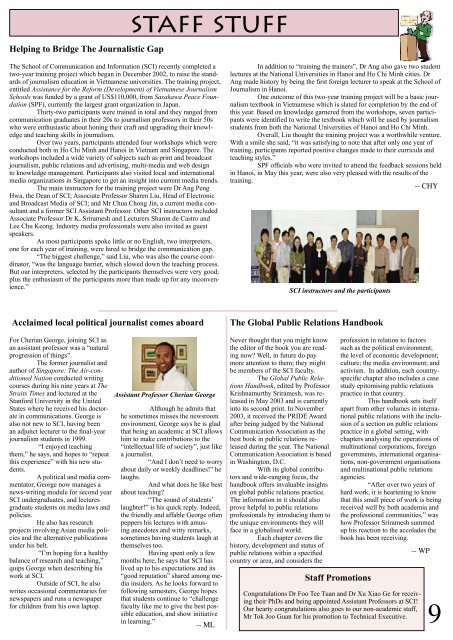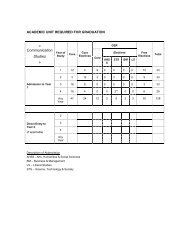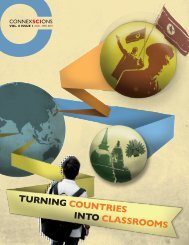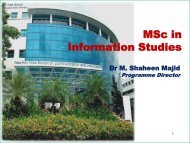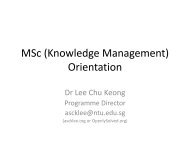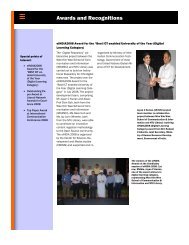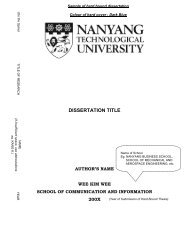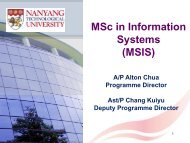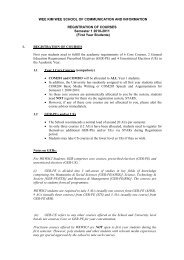Nov 2004 - Nanyang Technological University
Nov 2004 - Nanyang Technological University
Nov 2004 - Nanyang Technological University
You also want an ePaper? Increase the reach of your titles
YUMPU automatically turns print PDFs into web optimized ePapers that Google loves.
Helping to Bridge The Journalistic Gap<br />
staff stuff<br />
The School of Communication and Information (SCI) recently completed a<br />
two-year training project which began in December 2002, to raise the standards<br />
of journalism education in Vietnamese universities. The training project,<br />
entitled Assistance for the Reform (Development) of Vietnamese Journalism<br />
Schools was funded by a grant of US$110,000, from Sasakawa Peace Foundation<br />
(SPF), currently the largest grant organization in Japan.<br />
Thirty-two participants were trained in total and they ranged from<br />
communication graduates in their 20s to journalism professors in their 50s<br />
who were enthusiastic about honing their craft and upgrading their knowledge<br />
and teaching skills in journalism.<br />
Over two years, participants attended four workshops which were<br />
conducted both in Ho Chi Minh and Hanoi in Vietnam and Singapore. The<br />
workshops included a wide variety of subjects such as print and broadcast<br />
journalism, public relations and advertising, multi-media and web design<br />
to knowledge management. Participants also visited local and international<br />
media organizations in Singapore to get an insight into current media trends.<br />
The main instructors for the training project were Dr Ang Peng<br />
Hwa, the Dean of SCI; Associate Professor Sharen Liu, Head of Electronic<br />
and Broadcast Media of SCI; and Mr Chua Chong Jin, a current media consultant<br />
and a former SCI Assistant Professor. Other SCI instructors included<br />
Associate Professor Dr K. Sriramesh and Lecturers Sharon de Castro and<br />
Lee Chu Keong. Industry media professionals were also invited as guest<br />
speakers.<br />
As most participants spoke little or no English, two interpreters,<br />
one for each year of training, were hired to bridge the communication gap.<br />
“The biggest challenge,” said Liu, who was also the course coordinator,<br />
“was the language barrier, which slowed down the teaching process.<br />
But our interpreters, selected by the participants themselves were very good;<br />
plus the enthusiasm of the participants more than made up for any inconvenience.”<br />
In addition to “training the trainers”, Dr Ang also gave two student<br />
lectures at the National Universities in Hanoi and Ho Chi Minh cities. Dr<br />
Ang made history by being the first foreign lecturer to speak at the School of<br />
Journalism in Hanoi.<br />
One outcome of this two-year training project will be a basic journalism<br />
textbook in Vietnamese which is slated for completion by the end of<br />
this year. Based on knowledge garnered from the workshops, seven participants<br />
were identified to write the textbook which will be used by journalism<br />
students from both the National Universities of Hanoi and Ho Chi Minh.<br />
Overall, Liu thought the training project was a worthwhile venture.<br />
With a smile she said, “it was satisfying to note that after only one year of<br />
training, participants reported positive changes made to their curricula and<br />
teaching styles.”<br />
SPF officials who were invited to attend the feedback sessions held<br />
in Hanoi, in May this year, were also very pleased with the results of the<br />
training.<br />
-- CHY<br />
SCI instructors and the participants<br />
Acclaimed local political journalist comes aboard<br />
For Cherian George, joining SCI as<br />
an assistant professor was a “natural<br />
progression of things”.<br />
The former journalist and<br />
author of Singapore: The Air-conditioned<br />
Nation conducted writing<br />
courses during his nine years at The<br />
Straits Times and lectured at the<br />
Stanford <strong>University</strong> in the United<br />
States where he received his doctorate<br />
in communications. George is<br />
also not new to SCI, having been<br />
an adjunct lecturer to the final-year<br />
journalism students in 1999.<br />
“I enjoyed teaching<br />
them,” he says, and hopes to “repeat<br />
this experience” with his new students.<br />
A political and media commentator,<br />
George now manages a<br />
news-writing module for second year<br />
SCI undergraduates, and lectures<br />
graduate students on media laws and<br />
policies.<br />
He also has research<br />
projects involving Asian media policies<br />
and the alternative publications<br />
under his belt.<br />
“I’m hoping for a healthy<br />
balance of research and teaching,”<br />
quips George when describing his<br />
work at SCI.<br />
Outside of SCI, he also<br />
writes occasional commentaries for<br />
newspapers and runs a newspaper<br />
for children from his own laptop.<br />
Assistant Professor Cherian George<br />
Although he admits that<br />
he sometimes misses the newsroom<br />
environment, George says he is glad<br />
that being an academic at SCI allows<br />
him to make contributions to the<br />
“intellectual life of society”, just like<br />
a journalist.<br />
“And I don’t need to worry<br />
about daily or weekly deadlines!” he<br />
laughs.<br />
And what does he like best<br />
about teaching<br />
“The sound of students’<br />
laughter!” is his quick reply. Indeed,<br />
the friendly and affable George often<br />
peppers his lectures with amusing<br />
anecdotes and witty remarks,<br />
sometimes having students laugh at<br />
themselves too.<br />
Having spent only a few<br />
months here, he says that SCI has<br />
lived up to his expectations and its<br />
“good reputation” shared among media<br />
insiders. As he looks forward to<br />
following semesters, George hopes<br />
that students continue to “challenge<br />
faculty like me to give the best possible<br />
education, and show initiative<br />
in learning.”<br />
-- ML<br />
The Global Public Relations Handbook<br />
Never thought that you might know<br />
the editor of the book you are reading<br />
now Well, in future do pay<br />
more attention to them; they might<br />
be members of the SCI faculty.<br />
The Global Public Relations<br />
Handbook, edited by Professor<br />
Krishnamurthy Sriramesh, was released<br />
in May 2003 and is currently<br />
into its second print. In <strong>Nov</strong>ember<br />
2003, it received the PRIDE Award<br />
after being judged by the National<br />
Communication Association as the<br />
best book in public relations released<br />
during the year. The National<br />
Communication Association is based<br />
in Washington, D.C.<br />
With its global contributors<br />
and wide-ranging focus, the<br />
handbook offers invaluable insights<br />
on global public relations practice.<br />
The information in it should also<br />
prove helpful to public relations<br />
professionals by introducing them to<br />
the unique environments they will<br />
face in a globalised world.<br />
Each chapter covers the<br />
history, development and status of<br />
public relations within a specified<br />
country or area, and considers the<br />
Staff Promotions<br />
profession in relation to factors<br />
such as the political environment;<br />
the level of economic development;<br />
culture; the media environment; and<br />
activism. In addition, each countryspecific<br />
chapter also includes a case<br />
study epitomising public relations<br />
practice in that country.<br />
This handbook sets itself<br />
apart from other volumes in international<br />
public relations with the inclusion<br />
of a section on public relations<br />
practice in a global setting, with<br />
chapters analysing the operations of<br />
multinational corporations, foreign<br />
governments, international organisations,<br />
non-government organisations<br />
and multinational public relations<br />
agencies.<br />
“After over two years of<br />
hard work, it is heartening to know<br />
that this small piece of work is being<br />
received well by both academia and<br />
the professional communities,” was<br />
how Professor Sriramesh summed<br />
up his reaction to the accolades the<br />
book has been receiving.<br />
-- WP<br />
Congratulations Dr Foo Tee Tuan and Dr Xu Xiao Ge for receiving<br />
their PhDs and being appointed Assistant Professors at SCI!<br />
Our hearty congratulations also goes to our non-academic staff,<br />
Mr Tok Joo Guan for his promotion to Technical Executive.<br />
9


